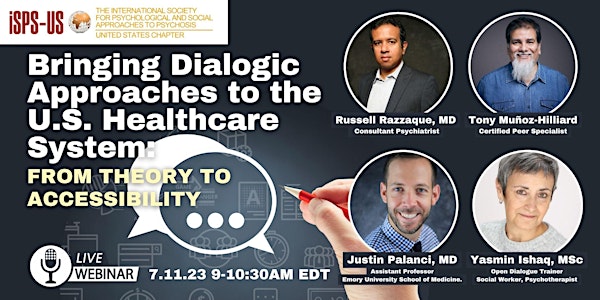Bringing Dialogic Approaches to the U.S. Healthcare System: From Theory to Accessibility
Summary
ISPS-US invites you to attend a panel presentation, featuring four eminent leaders from the U.S. and U.K. who will share their dialogic work, research, learnings, challenges and emerging best practices as inspired by Open Dialogue.
Description
Open Dialogue is a relational, community-based, response to mental health crisis and ongoing needs, first developed in Tornio, Finland in the 1990s. Interdisciplinary teams, including clinical and, more recently, peer workers engage individuals and their families and social networks from first contact in collaboration and dialogue. Initial data suggest that dialogic approaches maximize shared power and produce some of the best functional recovery outcomes in the world. These results have spurred efforts to expand research and develop these services internationally.
ISPS-US invites you to attend a panel presentation, featuring four eminent leaders from the U.S. and U.K. who will share their dialogic work, research, learnings, challenges and emerging best practices as inspired by Open Dialogue.
Can't make it live? Don't worry a recording will be sent to all those who register
About the presenter(s)
Russell Razzaque, MD
Dr. Razzaque works as a Consultant Psychiatrist in NELFT, where he is also an Associate Medical Director and Director of Research and Innovation. Additionally, he currently serves as an elected member of the Council of the Royal College of Psychiatrists, and he is a Visiting Professor at London South Bank University.
His particular field of clinical and research interest is mindfulness – which he has been a trainer in for over fifteen years – and Open Dialogue. He is currently leading a national initiative to bring Open Dialogue to the NHS, helping to coordinate an NIHR funded multi-centre randomised controlled trial. He has also published numerous papers in this area in recent years in peer reviewed journals.
Tony Munoz-Hilliard
Tony Muñoz-Hilliard is a certified peer specialist (CPS)/national certified peer specialist (NCPS) who firmly believes in the power of lived experience. Tony uses the challenges he has navigated in his own life to inspire hope in others and illustrate that recovery and whole-health wellness are indeed possible, despite mental illness, substance use and/or difficult life circumstances. Tony has lived experience with major depressive disorder and substance use, and uses his training in intentional peer support and the need-adapted treatment model to support and provide trauma-informed care to peers. Tony also works on a mobile treatment team in New York City and is an advisor for the Public Psychiatry Fellowship of New York State Psychiatric Institute at Columbia University Medical Center.
He has presented nationally and internationally on topics such as peers on interdisciplinary teams, peer workforce, trauma and social determinants of health. Tony is currently a student at SUNY Empire State College, where he is pursuing a bachelor’s degree in psychology, and is a trained video producer with Manhattan Neighborhood Network, which allows him to incorporate the arts in his recovery process. He also enjoys biking, movies, theater, painting, photography and travel, and is fluent in English, Spanish and French.
Justin Palanci, MD
Justin Palanci, MD, is an Assistant Professor in the Department of Psychiatry and Behavioral Sciences at the Emory University School of Medicine. He serves as Medical Director for the Assertive Community Treatment program at Grady Memorial Hospital. His interests include recovery-oriented care for persons experiencing serious mental illness, racial disparities in the assessment and treatment of psychosis, and the relationship between trauma and psychosis. Dr. Palanci is certified as a dialogic practitioner and trainer through the Institute for Dialogic Practice.
Yasmin Ishaq, MSc
Yasmin was a social worker and Psychotherapist in the UK public sector for over 35 years. In addition to the Peer Supported Open Dialogue training (2014), Yasmin undertook the 2 year trainers’ course in Dialogic Practice in Helsinki 2016-2018. She has worked in statutory mental health services in the UK for over 28 years and has been in management roles for the last 19 years. She has been at the forefront of developing new initiatives and started up the Early Intervention in Psychosis Service in East Kent in 2005 and the primary Care Mental Health Social Work Service in 2015. From 2016 to 2021 Yasmin led the 1st standalone Open Dialogue Service in the UK and evidenced that the approach could be developed, sustained and provide positive outcomes for individuals and families accessing specialist mental health services.
Yasmin currently provides training in Open Dialogue and consultancy support to organisations developing their dialogical practice. She also has a psychotherapy practice and offered clinical relational supervision to statutory and voluntary sector services.
BA(hons) MSc Social Work, M(Clin)Sc Psychotherapy
Accredited Trainer Open Dialogue and Dialogical Practice (Helsinki)
Independent Trainer, Social Worker, Psychotherapist and Clinical Supervisor
Register on Eventbrite: https://www.eventbrite.com/e/bringing-dialogic-approaches-to-the-us-healthcare-system-tickets-663533896747?aff=NeonOne

